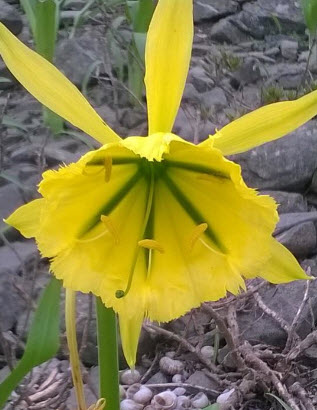Top Qs
Timeline
Chat
Perspective
Ismene amancaes
Species of plant From Wikipedia, the free encyclopedia
Remove ads
Ismene amancaes, commonly called amancae or amancay,[2][3] is a herbaceous plant species in the family Amaryllidaceae and native to the coastal hills of Peru.
Remove ads
Description
I. amancaes is a species with spherical bulbs 3.5–5 cm in diameter.[4][5] The leaves are strap-shaped, 25–50 cm long and 2.5–5 cm wide, bright green.[4][5] The 2–6 yellow pedicellate flowers are borne at the end of a scape up to 33 cm long.[4] The floral tube is greenish yellow, 5–7.5 cm long, bearing at the end the tepals, which are linear to narrowly lanceolate, 6–7.5 cm long, with green tips.[4][6] The floral corona is funnel-shaped, yellow with green stripes, 5–6 cm long, 6–8.5 cm wide, bearing the stamens facing inwards.[4][6][5]
Remove ads
Distribution and habitat

Endemic to Peru, Ismene amancaes inhabits coastal hills up to 1500 m of elevation, especially near the city of Lima, as part of the lomas ecosystem.[6][7][5][8]
Chemical compounds
It is reported that I. amancaes contains the alkaloids galantamine[9] and narcissidine.[10]
History
Remains of I. amancaes have been found in archaeological sites near the city of Lima.[11]
The flowering of this species was the subject of a festival ("Festival de Amancaise") celebrated in June in Lima, until the first half of the 1800s.[12] In a place among the hills surrounding Lima, people from the city gathered annually to celebrate the flowering of the plant in a festival with music and dance, similar to May Day.[12] The festival attracted people from all classes of the society then, while a common sight was people sporting the flowers in their garments.[12]
Remove ads
Conservation
I. amancaes is considered an endangered species by the IUCN since 1997.[13]
References
Wikiwand - on
Seamless Wikipedia browsing. On steroids.
Remove ads


